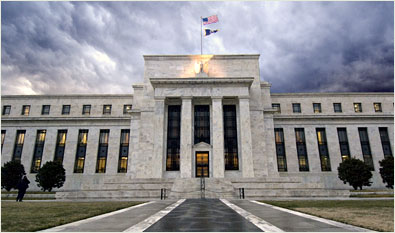
The National Debt UPDATE

The Federal Reserve Building
THE NATIONAL DEBT
How much the U.S. government owes is called the National Debt and to no one’s surprise, it grows larger by the day.
Actually by the second.
For a sobering look as to just how fast and how much, check out the website www.usdebtclock.org.
Our debt is about to hit 29 trillion. This is what we spend (and are spending) that we do not take in from taxes and other revenue sources.
That stunning figure does not include our unfunded liabilities, which are debts we are on the hook for but are not yet due (like an end of the month payment at mid-month).
Unfunded liabilities can only be estimated and by estimation, they stand at 157 trillion by that same U.S. debt clock. Other figures tossed about double that. Like I said, it depends on how one figures it.
It took about 200 years for the U.S. to amass its first trillion in debt. Now we borrow that much debt every year. That is the power of compounding. It can help you when saving money but bite you in the you-know-where if you are on the borrowing end.
Just how much is a trillion?
Measured in time, 1000 seconds is about 17 minutes. Sit down for a million seconds and you can resume standing up in 11.5 days.
Repeat the same exercise for a trillion seconds and you wouldn’t be there anymore, and probably neither would anything else. A trillion seconds ticks off in 31,688 years.
Imagine that.
Well actually, I can’t.
But the over spenders can. Or maybe they can’t. Because if they could, maybe they wouldn’t spend that much.
Think again.
The current spending figures for the CoVid bailout is about 3.5 trillion dollars. Measured at a dollar a day it stands at about 110,908 years.
This does not include another 1.9 trillion in additional spending proposed in the next bill from Washington.
Do we want it to pass?
Guess that is a matter of opinion right? (And no, I am not giving mine).
Considering the amounts, we can assume it is a foregone conclusion the U.S.will never pay off its debt. With 29 trillion on the hook, it’s literally impossible. Too bad for those creditors, which by the way includes American taxpayers.
Reminding everyone about the additional unfunded liabilities, (that figure again is 157 trillion), in years that amounts to “E”, also known as error, as that is what my calculator says when I attempt to arrive at a total.
I’m not real good at carrying zeros so hence the reason I list an “E” as an answer. Whatever my calculator says, it basically should say “N” for never.
With a number so large, does it really matter how much we owe?
In the words of Former Vice President, “deficits don’t matter”.
My opinion is that “deficits don’t matter, until they do”.
If deficits don’t matter, why have deficits brought countless countries to their knees at the moment they did matter?
Better said, deficits don’t matter, until they are large enough, then they will.
The question then becomes how large can the U.S. deficit become before the “it matters” moment arrives.
No one knows. What we do know is that moment will arrive eventually. It approaches nearer and nearer with every dollar we spend.
What will happen when the “it matters”’ moment arrives?
We have countless examples throughout history to draw from:
Inflation gradually accelerates long before the “moment” arrives. Rapidly accelerating inflation will be the next canary in the coalmine. Next will follow rising interest rates, first purposely raised by the monetary authorities, then they will rise on their own uncontrollably. The public bond market will start to convulse and bond auctions (the public markets where debt is sold) will begin to fail. This occurs because interest rates are rising so fast, debt buyers will not commit funds to a fixed interest rate product because rates are rising too fast. The final straw will be lack of confidence in the currency in question, and then, basically, all hell breaks loose.
When the currency has its “Mexican Peso” moment, you can imagine how life will be. Usually governments will then attempt to make a new currency, or get a bailout from somebody. In the case of the U.S., the question becomes is any one entity big enough to bail out the largest economy on the planet?
Let’s not go there.

Turning 65?
Call me
Medicare Agent in the State of California
This article is opinion only of Marc Cuniberti, and may not represent those of this news media and should not be construed as investment advice nor represents the opinion of any bank, investment or advisory firm. Neither Money Management Radio (“Money Matters”) nor Bay Area Process receive, control, access or monitor client funds, accounts, or portfolios. Contact: (530)559-1214 or news@moneymanagementradio.com







